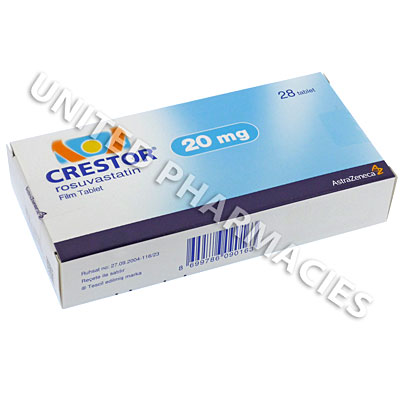Customers also like
Rosuvas (Rosuvastatin Calcium) - 20mg (10 Tablets)
our best price : $15.02
Lipvas (Atorvastatin Calcium) - 20mg (10 Tablets)
our best price : $4.40
Arrow-Simva (Simvastatin) - 20mg (90 Tablets)
our best price : $17.75
Rosulip (Rosuvastatin) - 10mg (15 Tablets)
our best price : $9.18
Zarator (Atorvastatin Calcium) - 10mg (90 Tablets)
our best price : $19.85
Gold KRILL (Euphausia Superba) - 500mg (30 Capsules)
our best price : $27.62
Livercol (Rosuvastatin Calcium) - 10mg (28 Tablets)
our best price : $7.88
Ezemibe (Ezetimibe) - 10mg (30 Tablets)
our best price : $6.83
Description
Crestor (Rosuvastatin) belongs to a group of drugs called statins. It works by lowering cholesterol, and this is achieved in 2 different ways. Firstly, it blocks a certain enzyme in the liver, resulting in decreased cholesterol production by the liver. In addition to this, the amount of cholesterol broken down by the liver is increased. This means that it can lower the risk of strokes and heart attacks in adult patients. Patients with diabetes, hypertension, obesity or other health factors may also be prescribed this medicine to lower the risk posed to their health.
Crestor (Rosuvastatin) tablets must be taken exactly as instructed by your physician. Do not exceed the prescribed dose. Adult patients undergoing treatment for hyperlipoproteinemia may be told to take a dosage of 5mg to 10mg, once per day, for the initial treatment period. This may be increased if the prescribing physician deems it necessary, and a maintenance dosage ranging from 5mg to 40mg may be prescribed. Other conditions may require different doses, and the patient`s individual circumstances may also affect the required dosage. Therefore, it is essential to consult your physician prior to the commencement of treatment.
Possible side effects of Crestor (Rosuvastatin) include:
- Coughing
- Depression
- Indigestion
- Sore joints
- Memory problems
Tell your physician if you are concerned about any side effects. If you notice numb fingers of toes, signs of an infection, appetite loss, abdominal pain, a loss of energy or any other indications of a serious reaction, you must immediately seek medical attention.
Regular blood tests will be required by your physician to test your liver prior to the commencement of treatment.
Older patients are considered to be more at risk of severe kidney and muscle problems during the course of treatment.
















